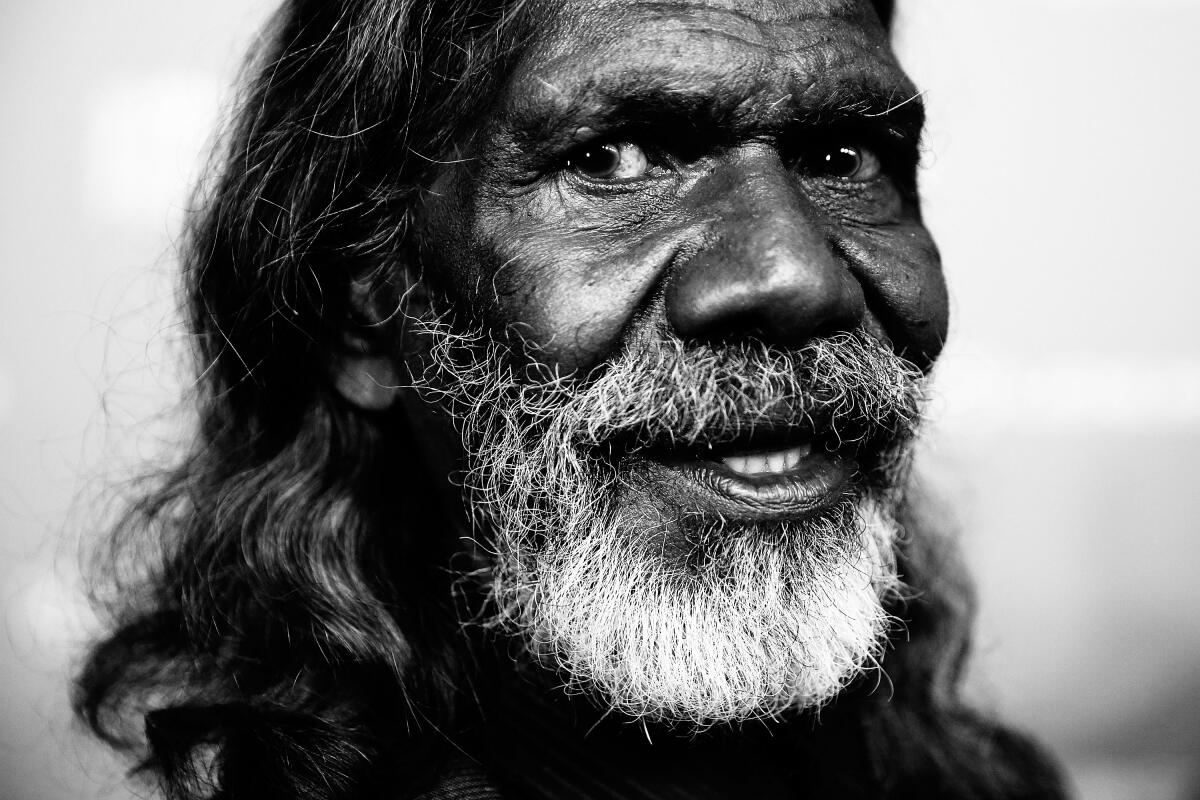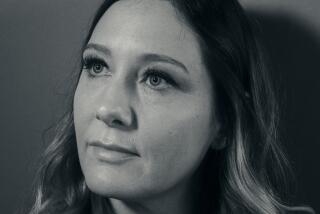David Gulpilil, Indigenous actor known for ‘Crocodile Dundee’ and ‘Australia’ roles, dies

- Share via
David Gulpilil, Australia’s most acclaimed Indigenous actor who rose to fame in “Crocodile Dundee,” has died of lung cancer, a government leader said Monday.
In a career that spanned five decades, Gulpilil found his widest audiences through his roles in the 1986 hit film “Crocodile Dundee” and in director Baz Luhrmann’s 2008 epic “Australia.” He was often described as a bridge between Indigenous Australia and the outside world who never fit comfortably in either place.
“It is with deep sadness that I share with the people of South Australia the passing of an iconic, once-in-a-generation artist who shaped the history of Australian film and Aboriginal representation on screen,” South Australia state Premier Steven Marshall said.
An accomplished didgeridoo player, Gulpilil mixed with Jimi Hendrix and Bob Marley. He was feted in New York and Paris. He also spent periods of his life as an itinerant, drinking and sleeping in parks in the northern Australian city of Darwin and spent time in prison for alcohol-related offenses.
Gulpilil was born on tribal land in the sparsely populated wilds of the Australian northern frontier in the early 1950s, his friend and caregiver Mary Hood said. His date of birth was recorded as July 1, 1953, a guesswork date set by local missionaries. It was believed he was 68 at the time of his death.
Gulpilil said he never saw a European Australian until he was 8 and considered English his sixth language, his biographer Derek Rielly wrote. Gulpilil’s Christian name was foisted upon him at school.
Gulpilil was a 16-year-old ceremonial dancer performing in the Indigenous mission of Maningrida in 1969 when he met British director Nicolas Roeg, who was scouting for filming locations. Gulpilil starred in Roeg’s acclaimed 1971 movie “Walkabout” as a lone youth wandering the Outback as part of a tribal rite of passage, who comes across and rescues two lost British children. The British siblings were played by a teenage Jenny Agutter, who later found fame in Hollywood, and the director’s 7-year-old son, Lucien.
Roles followed in popular movies “Storm Boy” in 1976 and “The Last Wave” in 1977.
His final role was the remake of “Storm Boy” in 2019, in which he played the father of the central character, Fingerbone Bill.
Gulpilil recalled learning to binge on alcohol and drugs from counterculture icon Dennis Hopper, who played the starring role in the 1976 movie about a 19th century Australian outlaw, “Mad Dog Morgan.” The 22-year-old Indigenous actor had third billing on the film after Hopper and Jack Thompson, a stalwart in Australian cinema.
Gulpilil won multiple lead actor awards for the 2002 Rolf de Herr-directed movie “The Tracker,” in which he played one of the many Indigenous men that Australian police routinely used as trackers of fugitives in the Outback.
Weeks before the movie was released, journalists visited him in the small Indigenous community of Ramingining on his crocodile-infested tropical tribal land. He was living in a hut with his then-partner, Indigenous painter Robyn Djunginy, without power or running water.
They cooked kangaroo meat and fish over an open fire beneath a scrap iron roof. Hunting spears were slung from a rafter and Gulpilil kept a wooden Indigenous fighting club known as a nulla nulla for protection.
“I was brought up in a tin shed. I wandered all over the world — Paris, New York — now I’m back in a tin shed,” Gulpilil said.
He presented himself as a victim of his own celebrity and his own people’s misunderstanding of his position in the wider world.
“People say to me: You’re a big name. You have money. Why don’t you buy yourself a house; get out of Ramingining?” he said.
“This is my country. I belong here, and I’m broke,” he added.
Exactly why he was broke was not clear. He was vague about how much he earned over the years, and wealth in Australian Indigenous society is communal, tending to permeate through relatives and friends.
Back then, Gulpilil liked to drink beer, smoke marijuana and take kava, a plant that acts as a sedative. But because all three were banned in Ramingining, he avoided some of the temptations of city life excesses.
Gulpilil’s friend and caregiver, Hood, first met him in 2006 at the Darwin premiere of “Ten Canoes,” the first feature-length movie in an Australian Indigenous language.
Gulpilil narrated the movie and his son, Jamie Gulpilil, was part of the cast that was mostly drawn from Ramingining.
“When I first met him, I saw a real kindness,” Hood said. She acknowledged there was also a “dark” side.
A Darwin judge sentenced Gulpilil in 2011 to a year in prison for breaking the arm of his then-partner, Indigenous artist Miriam Ashley, during a drunken argument in a Darwin home. He used his time in prison to turn his life away from alcohol and cannabis.
Hood regularly visited Gulpilil in prison. He was released to live with her and she became his caregiver after he was diagnosed with inoperable lung cancer in 2017.
He is survived by his sisters Mary and Evonne, daughters Makia and Phoebe, and sons Jamie and Jida.
More to Read
Start your day right
Sign up for Essential California for the L.A. Times biggest news, features and recommendations in your inbox six days a week.
You may occasionally receive promotional content from the Los Angeles Times.






